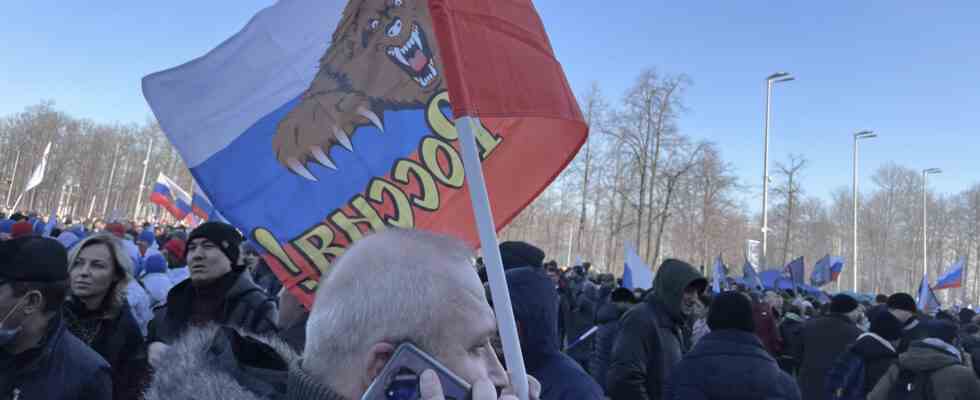Status: 03/24/2022 04:53 am
Four weeks ago, Russian troops attacked Ukraine. The consequences are also devastating for Russian society: tens of thousands are leaving, and a human rights activist fears that Russia will be “archaic”.
The crowd is packed in front of the Luzhniki Stadium in Moscow. “I can’t breathe,” groans a woman, slightly panicked. Orange and black striped flags with an imprinted Z are waving above their heads. The colors of the George ribbon and the Z signal approval for the war in Ukraine, which must be publicly described as a “military operation”. “Home, freedom, Putin,” they keep chanting. Parties and families with children are also represented – and the martial “Night Wolves”, Russia’s largest biker club, a close ally of the Kremlin. The reason for the mass gathering is the eighth anniversary of Russia’s official annexation of the Crimea peninsula from Ukraine.
On the so-called Crimean Day in front of the Luzhniki Stadium in Moscow: orange and black George ribbons and the “Z”.
Image: ARD Studio Moscow
The masses, brought in under pressure or genuinely enthusiastic, shortly thereafter cheer Putin. In a short speech, the Russian President said that the people of Crimea had defended themselves against Nazism and genocide. The rest of Ukraine must also be liberated, he claims. In mid-March, in connection with critics, Putin spoke of “rabble” and “traitors” who had to be spit out; his spokesman speaks openly of “purges”. And Russia’s new censorship law provides for up to 15 years in prison for anyone who spreads false information, including about the Russian army. In addition, Facebook and Twitter were banned by the courts and some of the last independent media outlets were shut down, including the Dozhd TV station and the Echo Moskvy radio station.
No tailwind for big protests
All of this has exacerbated the already prevailing atmosphere of fear and intimidation, says Lev Ponomaryov, director of the non-governmental organization “For Human Rights”. A few days ago, unknown persons daubed the entrance to the office in Moscow with large black letters Z and V – symbols for the support of Russian troops in Ukraine. A clear attempt at intimidation. The 81-year-old says that something like this would happen more often after events such as the Crimean anniversary. At his age, he now has to think about how he can fight fascism in the Russian Federation, which is becoming more and more evident, says Ponomaryov, who started a petition against the Ukraine war and collected more than 1.2 million signatures.
A few days ago, unknown persons smeared the office entrance of the organization “For Human Rights” with large black letters Z and V.
Image: ARD Studio Moscow
He was already helping to organize protests and civil resistance in the late 1980s. Not everyone in Russia is pro-Putin, he says. But he doesn’t expect peaceful mass protests like those shortly before the end of the Soviet Union, in 2011 after the parliamentary elections, or in 2021 for the opposition leader Alexei Navalny: Hundreds of thousands could not be brought onto the streets without the tailwind of the times. According to the independent Russian legal aid organization OVD-Info, around 15,000 people have been arrested for anti-war protests in more than 50 cities, most of them in Moscow and Saint Petersburg.
Green ribbons in public spaces are said to symbolize the Ukrainian colors of yellow and blue, but so far many have not been seen in the cities. In contrast to Russia, there is a real culture of protest in Ukraine, says Ponomarev. Putin is now taking revenge on the Ukrainians for the Maidan protests in 2013 and 2014.
Ponomarev fears “archaization”
The sanctions imposed because of the war are having a visible effect on everyone. Apart from closed shops, supermarkets are beginning to see gaps on the shelves. Tens of thousands have left Russia since February 24th. turned his back. Out of a lack of prospects, protest, fear of repression or economic consequences. These included actors, directors, members of companies and the media, members of the opposition. They traveled to EU countries, but also to Armenia or Georgia, where they do not need an entry visa. According to the Interior Ministry there, 30,000 people came to Georgia alone, and 18,000 traveled further.
This means an archaization of society, human rights activist Ponomarev analyzes the wave of departures: Passive people who tend to support the Russian leadership and who are also afraid of being labeled “enemies of the people” would remain. All of this is throwing Russia back years. In view of the consequences of the sanctions and the resulting increase in poverty, he believes that socially motivated protests are entirely possible.
Despite all the uncertainty – Ponomarev seems surprisingly relaxed. He doesn’t feel afraid and leaving the country is out of the question for him. He reported the graffiti to the relevant Moscow authorities. Normally this would come quickly, but so far it has taken its time, he says. The hostilities continue. On Wednesday, several attackers pepper sprayed the office, insulting the team. One of the attackers is said to have already insulted Ponomaryov when he handed the anti-war petition to the presidential office.

